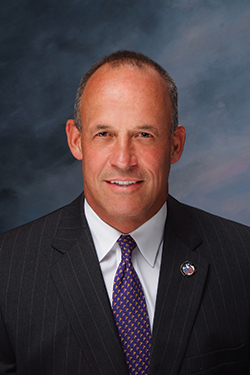
Let me begin with a sincere “thank you” to iBi Publisher Jan Wright for selecting “education” as the theme for this issue. I believe readers will recognize that this has been one of my most consistent subjects. Together with quality city services, public education directly contributes to our success as a competitive and desirable community. And I am also very appreciative that Peoria Promise is featured so prominently.
When we kicked off Peoria Promise four years ago, it was with our fingers crossed that it would be a new beginning for hundreds of Peoria kids. It would be a great opportunity to pursue affordable higher education. Our dreams were not in vain, as this special initiative has taken hold and is indeed a critical boost for hundreds of deserving young men and women. While we have continuing funding challenges, the success of the program begets its own future success. I hope all iBi readers will embrace and support Peoria Promise, if they haven’t already done so.
Keying off the hopes and dreams of Peoria Promise, I would like to continue expanding on the “promise” of Peoria’s potential educational greatness that I discussed in my June column. As I think about what we can be, and as I share my thoughts with—and absorb the experiences from—my peers in other urban communities, I am encouraged when I ask the question, “What if?”
What if we focus on approaching Peoria’s potential educational success in the spirit of collaboration, cooperation, mutual respect, patience and partnership? What if all the stakeholders put aside parochial concerns and narrow institutional perspectives and looked at the big picture? What if the big picture is all about extraordinary academic achievement in the classroom, in partnership with our dedicated teachers and support staff, administrators, board members, and other partners such as union organizations, elected officials, and ultimately, the general public who pays the bills?
I recognize that this is a tall order. The demands of our daily jobs and other commitments leave precious little time for even more “community tasks.” But as I’ve said many times, nothing is more important to the city’s future as a competitive and desirable urban community than the combination of quality and dependable city services and best-of-class public education. We simply have no choice but to make these “what-ifs” “what is.”
One important approach for corralling all of the stakeholders and interested parties into achieving our “what ifs” would be the formation of a Peoria education commission. Such a body would heighten the momentum generated by the recent education symposium. We also have momentum with new, enthusiastic District 150 academic and administrative leadership. Just as importantly, we have the willingness of the teachers’ union to engage in progressive discourse. And most critically, we have great public interest.
A Peoria education commission would be an inclusive body encompassing representatives of essential stakeholders and other educational organizations that are either the “supplier,” “recipient” or “partner” with our public system. I envision that at the same table would be representatives from private and public educational providers, including our wealth of higher educational institutions. Other members would include union organizations, Peoria Promise and other interested parties who have demonstrated commitment to a stronger and overall higher-quality community.
What if the commission could construct “The Peoria Compact”? This would be a mutually agreed-upon document of goals, with line-of-sight actions to achieve those goals. What if the commission could serve as a forum to constructively argue differing points of view within the template of “What is the very best for the community?” What if deliberations started with handshakes and greetings of good intentions, and ended with self-congratulations of “We did it ourselves!”?
I’ve said before that I did not run for mayor to maintain the status quo in City Hall, in our neighborhoods or in our community’s critical institutions, such as the pubic schools. We can do better. I intend to stay the course, and promise to the best of my ability to listen, to cooperate, to convene, to collaborate and to be patient. There is no question in my mind that “what if” can be “what is.” iBi

